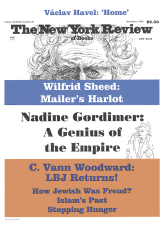In response to:
The Art of 'Call It Sleep' from the October 10, 1991 issue
To the Editors:
There is perhaps no higher tribute to the greatness of a literary masterpiece than disagreements among the readers about some major aspect of its meaning. Much as I loved Alfred Kazin’s beautiful essay on Henry Roth’s Call it Sleep [NYR, October 10], also one of my very favorite American novels, I fervently disagreed with the critic’s interpretation of one of the story’s central motifs: the narrator’s, David’s, plausible illegitimacy.
In Mr. Kazin’s view “David’s supposed Gentile parentage” is only a figment of his father’s—a pathologically mean and bitter man—imagination, an excuse to torment his sweet wife Genya, the child and himself. Yet the tremendous mystery of the book, and of David’s otherness lies in much evidence that he indeed could be sired by Genya’s Polish lover in Galicia, the organist (an artist!) Ludwig. David learns about his mother’s secret overhearing Genya’s confession to her sister—not mentioned by Mr. Kazin—which contains details of the carnal nature of Genya’s affair with cynical Ludwig (a staple figure in Yiddish literature), consummated in the wintertime, while “…in May I grew.” A Jewish husband, himself of ill repute, is hastily found by Genya’s parents who provide him with money to leave for America immediately after the wedding. In a masterly stroke the author has the two women talk partly in Polish, the language David can’t understand, and only the word benkart (bastard), same in Polish and Yiddish, repeatedly falls on his ears. The reader is reminded of the scene in the Prologue, when meeting his wife on the dock, the husband admonishes her for not saving on the fare by taking a few months off the boy’s age. She answers that she couldn’t because the boy was big for his age, “born very big.” And her explanation why she didn’t bring David’s birth certificate is quite lame. No wonder that the husband, his meanness notwithstanding, was, as Mr. Kazin writes, “hysterically” suspicious. Furthermore, when David becomes infatuated with a charming and manipulative Polish boy from the West Side and enables him to have sex with his aunt’s Jewish stepdaughter, the deep association of this event with the mother’s “sin” cannot escape not only the father but also the reader.
By choosing to downplay this crucial drama—leading to David’s nearly fatal accident—Mr. Kazin who praises the author for his courage to create an utterly negative (or sick, in this reader’s view) character of the Jewish father, and for the absence of sentimentality and “lyrical expansiveness” characteristic of the autobiographical novels of the period, might himself have stopped just short of bravely acknowledging Henry Roth’s daring in introducing to his autobiographical material the unresolved, but strongly suggested issue of his protagonist’s ethnic impurity.
Joanna Clark
Princeton, New Jersey
Alfred Kazin replies:
Joanna Clark’s detective work is fascinating, but I am not so convinced that the admirable Genya could have lived a lie for so many years. Is the only explanation for David Schearl’s “otherness” the fact that he may be half-Polish? Believe me, Ms. Clark, you can be all Jewish and more “other” than a witch.
This Issue
December 5, 1991



